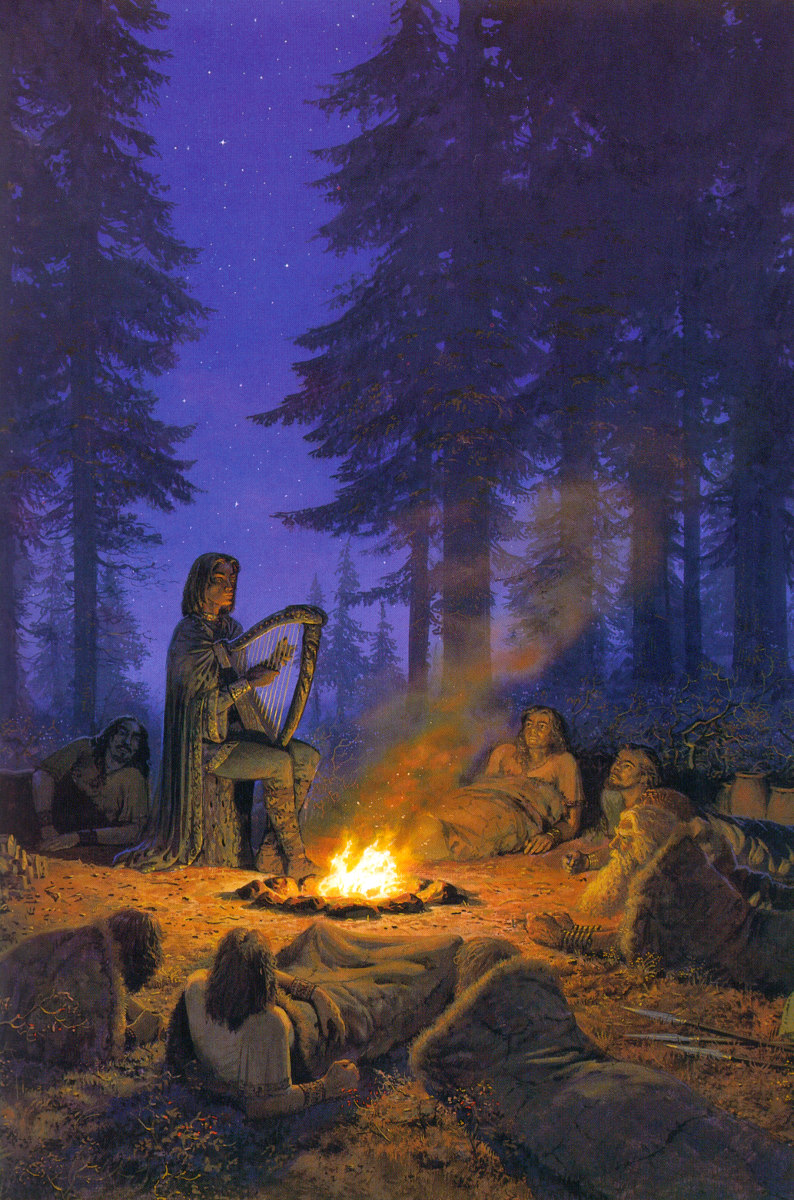
"Felagund among Beor's Men" by Ted Nasmith
Rolozo Tolkien
Now
men awoke and listened to Felagund as he harped and sang,
and each thought that he was in some fair dream,
until he saw that his fellows were awake also beside him;
but they did not speak or stir while Felagund still played,
because of the beauty of the music and the wonder of the song.
Names: Finrod (Quen. Findàrato), Felagund, Artafindë, Ingoldo, Nóm, Felak-gundu,
Titles: The Faithful, Friend of Men, Lord and King of Nargothrond
Lineage:
Though of the royal line of the Noldor, Finrod is akin both to the Vanyar and to the Sindar:
Father: Finarfin, third son of
Finwë, high-king of the Noldor, in his marriage to Indis of the Vanyar,
Mother: Eärwen, daughter of Olwë, king of Aqualondë,
Brothers: Orodreth, Angrod, Aegnor
Sister: Galadriel
Once in Beleriand, the high-kingship of the Noldor passed from the house of Feänor to the house of Fingolfin. But it was the destiny of the friends, Finrod and Turgon, to establish the great realms of the Noldor in exile: Nargothrond and Gondolin. In this they were led by Ulmo himself, who had laid a dream on them in which they were called to "prepare for a day of evil, and to establish a retreat".
When Finrod told Elwë Singollo of his
admiration for the halls of Menegroth in Doriath, Elwë told him
about the gorge of the river Narog. And it was there that Finrod delved
the stronghold of
Nargothrond. In this he was aided by the dwarves of the Blue Mountains,
who
were given many jewels of Valinor for their efforts. But the dwarves
made
for Finrod the necklace called Nauglamir, most renowned of all the
dwarven-works
of old. The dwarves called Finrod “felak-gundu”, hewer of caves, and by
the
name of Felagund he was called since then.
The realm of Nargothrond stretched from Doriath and
the
river Sirion in the east to the havens of Cirdan in the west. In the
north,
Nargothrond even touched upon the very plains of Ard-Galen. There, in
the
narrow valley between Dorthonion and the Shadowy Mountains, upon the
isle
of Tol Sirion, Felagund built the mighty watchtower of Minas Tirith.
Thus
it came that the realm of Finrod was the greatest by far in Beleriand,
though
he was the youngest of the Noldor Kings.
Wandering through the wild beauty of Ossiriand,
Felagund encoutered the first of the Edain to cross the Blue Mountains,
the kindred of Beör the Old. Then for them he played harp-music
and sang songs of
learning and wisdom. Thus to the first Men that entered Beleriand
came
visions of Valinor. And Felagund they called “Nóm”, which means
Wisdom
in the language of these Edain. And Felagund became a teacher to the
Edain,
and gave them lands to live in, pleading on their behalf before King
Thingol.
But Beorn and his family stayed with Felagund in Nargothrond.
In the horrible Dagor Bragollach, the armies of
Morgoth
led by Glaurung and many Balrogs broke the Siege of Angband. The sons
of
Finarfin bore the brunt of the assault, and Angrod and Aegnor were
slain.
But Felagund was then saved from peril by Barahir and his men. For this
Felagund
swore an oath of abiding friendship to Barahir and his kin, and gave to
Barahir
his ring as a token.
Thus it was that many years later Beren, son of
Barahir,
came to Felagund with the burden laid upon him by Thingol: to go and
take
a Silmarillion from the crown of Morgoth himself. And in this he sought
the
aid of King Felagund. Then Felagund knew himself to be ensnared in the
Oath
of Feänor after all. For in fulfilling his own oath to Barahir he
would
find the sons of Feänor on his path. And it came to be that
many
of his people were won over by Celegorm and Curufin, disclaiming an
oath
to a mere Man, claiming their first right of Oath and Silmarillii. Then
Felagund
and Beren journeyed into the valley between the Ered Withrin and
Dorthonion
with only ten companions. But the watchtower of Tol Sirion was now
taken
by Sauron, and it was renamed Tol-in-Gauroth. And Sauron was ware of
everything
that would pass. Thus befell the contest of Sauron and Felagund which
is
renowned.
In the "Lay of Leithian", most beautiful of the epic
poems
of Middle Earth, it is told how the Elvenking fought the evil Maia:
”The chanting swelled, Felagund fought,But the song of Sauron then turns to the doom of the Noldor, to the kinslaying of Aqualondë and the doom of Mandos, and Felagund is stripped of his power:
And all the magic and might he brought,
Of Elvenesse into his words.
Softly in the gloom they heard the birds
Singing afar in Nargothond,
The sighing of the sea beyond”
“The captives sad in Angband mourn,Sauron locked the twelve into a pit, and threatened to slay each cruelly, if they would not tell him the true identity of Felagund. But none would betray the elvenlord, though each night a werewolf came to devour one of them. And when only Beren and Felagund were left, the werewolf came for Beren. Then Felagund in a last and desperate effort burst his chains and slew the wolf with his bare hands and teeth. But he himself was mortally wounded.
Thunder rumbles, the fires burn-
And Finrod fell before the throne”
“He died then in the dark, in Tol-in-Gauroth, whose great tower he himself had built. Thus King Finrod Felagund, fairest and most beloved of the house of Finwë, redeemed his oath.”
References:
Silmarillion, The History of Middle Earth, volumes III,
XI, XII
top